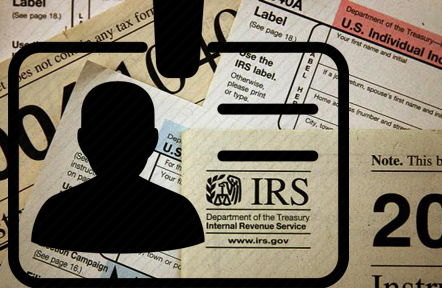Amegy Bank Event Highlights Economic Impact of Houston Immigrants and Need for Reforms
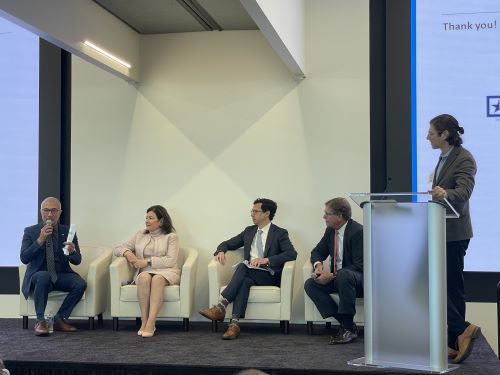 Business leaders, immigration experts, and elected officials gathered at a recent event hosted by Amegy Bank and the Texas Association of Business in Houston, Texas, to discuss data that proves the significant positive economic impact of immigrants in the region and to emphasize the need for solutions to address workforce and border security challenges.
Business leaders, immigration experts, and elected officials gathered at a recent event hosted by Amegy Bank and the Texas Association of Business in Houston, Texas, to discuss data that proves the significant positive economic impact of immigrants in the region and to emphasize the need for solutions to address workforce and border security challenges.
Steve Stephens, President and CEO of Amegy Bank, said the number one issue that most businesses that the bank works with face is skilled workforce shortages, and that sensible immigration policy reforms could help to improve immigrants’ role in bridging the gap while simultaneously improving border security.
“If you ask any one of our clients or prospects ‘what’s the most important issue for your business,’ they’re going to say workforce. Workforce and probably inflation and they’re interrelated. Quality of workforce, work ethic is a major issue for our clients. So that’s one of the reasons we’re hosting this event. The second reason…the demand of the economy basically dictates that we’ve got to come up with a solution. The last reason, it’s irrefutable, is the demographic and economic data that shows how immigration provided our economy. That’s not a guess,” said Steve Stephens, noting that when it comes to immigration policy that addresses workforce needs and border security it should be an “and, not or,” conversation.
Stephens added that “Former Federal Reserve Bank of Dallas President Robert Kaplan talks about the national debt and leverage of the U.S. Well we’re not going to reduce our debt, so the only thing we can do is grow our GDP and revenue. There are two drivers to GDP growth, productivity and workforce growth, and we’ve had flat workforce growth the last five years. So if we want to resolve our fiscal challenges we’ve got to increase our workforce.”
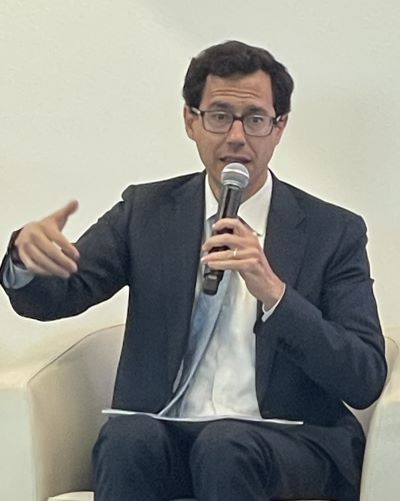 Echoing Stephens’ comments, Glenn Hamer, CEO of the Texas Association of Business said that the number one issue that he hears about from chambers of commerce throughout Texas is “workforce, workforce, workforce.”
Echoing Stephens’ comments, Glenn Hamer, CEO of the Texas Association of Business said that the number one issue that he hears about from chambers of commerce throughout Texas is “workforce, workforce, workforce.”
“It’s skills and it’s workforce, and when you think about it, it makes sense. We have far more jobs open in the State of Texas than we have people to fill them, and there are a lot of issues when it comes to skills, and we’re all working on that collectively when it comes to trade schools and Lonestar college, but even with the right skills we just simply need more workers,” said Hamer.
“What I appreciate about the chance we’re going to have today is to discuss those solutions. Yes we can increase border security, when the entire world basically wants to come to your country and you need workforce, you can devise a system so we can get those workers. There’s not a supply issue of people who want to come to the US and contribute. So we need an orderly system… I think we all know that the number one issue right now on policy and politics is the border, is immigration. Here we are in the state where it’s the most important to solve those issues… One of the greatest comparative advantages for the U.S. is that the best, brightest, and hardest working people want to come here and work…google the numbers, the deficit is not as high as it would have been and the growth is higher than it was projected in large part because of an immigration boom in this country. Demographically there are a lot less people being born in this country, and unless we’re going to play a lot of Barry White music, we’ve got to find a way to replenish,” said Hamer.
“We’ve gotta figure out a way to legally bring people into this country, we do need additional border security, we do need to know who is coming into this country. However, if a bill going to pass Congress, we have to legalize the DACA population. They are the most well vetted people. That has to be a part of any deal, and then we can start talking about other reforms as well,” he added on needed solutions.
Chelsie Kramer, Texas State Organizer of the American Immigration Council, presented new data on Houston metro Immigrants’ economic contributions while stressing the importance of the Texas Business Community making the case for workforce-friendly immigration policy to lawmakers.
“The data today will show everyone that Houston is poised to lead, and we need to make sure that we have a seat at the table when anyone is talking about immigration policy because we are going to be disproportionately affected and we need to make sure that our voices are heard,” she said.
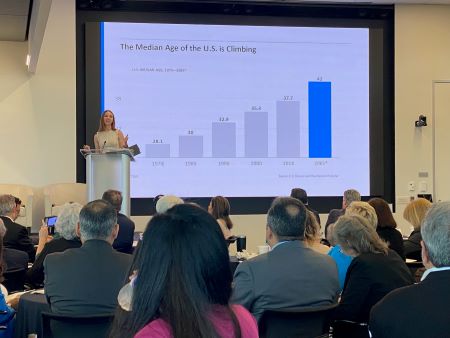 Notable data that Kramer discussed included:
Notable data that Kramer discussed included:
- Immigrants in Houston contributed billions in taxes and consumer spending. In 2021, immigrant households earned $66.5 billion in income, with $11.1 billion going to federal taxes and $5.2 billion going to state and local taxes, leaving them with $50.2 billion in spending power that can be reinvested in local communities.
- Immigrants were 60.7% more likely to be entrepreneurs than their U.S. born counterparts and made up 41.9% of all entrepreneurs in the Houston metro area. In other words, immigrants create jobs at higher rates, including jobs for natives.
- International students support jobs in Houston. In 2021, International students supported 3,800 local jobs and contributed $425 million to the U.S. economy. In 2021, there were 16,206 international students enrolled in colleges and universities in the Houston metro area.
- 33.7% of the immigrant population in Houston was undocumented in 2021, earning $13 billion and paying $795 million in federal taxes and $596 million in state and local taxes while wielding $11.6 billion in spending power. “A lot of folks say let’s talk about visas, green cards, and naturalization, but they immediately shy away from the undocumented population. We can’t do that in the City of Houston and the State of Texas because the undocumented population are contributing immensely to our economy. They’re absolutely critical to so many of our industries…when we have these difficult conversations about how to move the needle forward on immigration, remember there is a large group of people who are living in the shadows making immense contributions so they should be part of this discussion when it comes to commonsense solutions,” said Kramer.
Kramer also noted the critical role that immigrant workers play in supporting the aging U.S. population by contributing to social programs while consuming these benefits at lower rates than native-born Americans.
“We are below replacement birthrate here in the United States and that continues to be the trend. If we want to continue to be a growing economy, we have to make sure that we have a workforce for the future. Immigration is going to be a big part of that, not only when it comes to filling open jobs but also when it comes to supporting an aging population. One of the biggest myths that we hear about immigration is how are immigrants taking from and are they contributing to our social programs? Of course they’re contributing, we just saw the huge numbers that are going into federal and local taxes, But when we start thinking about that aging population that the United States and Texas have, we start thinking about how are we going to help that aging population with our social programs. We can see that immigrants in the Houston Metro are contributing huge numbers to our social programs and they typically access Medicare and Medicaid less than a native-born citizen as well,” she said.
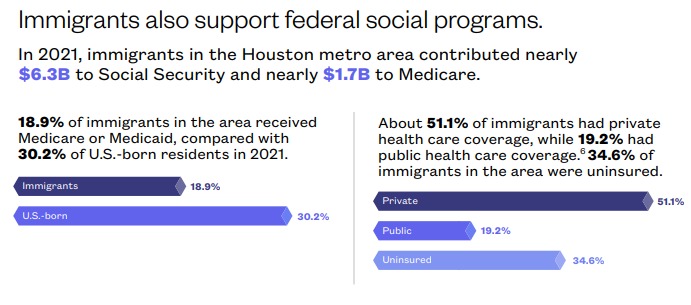
Kramer also highlighted the outsized role that Houston Immigrants play in the local labor force and key industries.
“Immigrants are punching well above their weight in every single metric that we look at here in Houston,” she said.
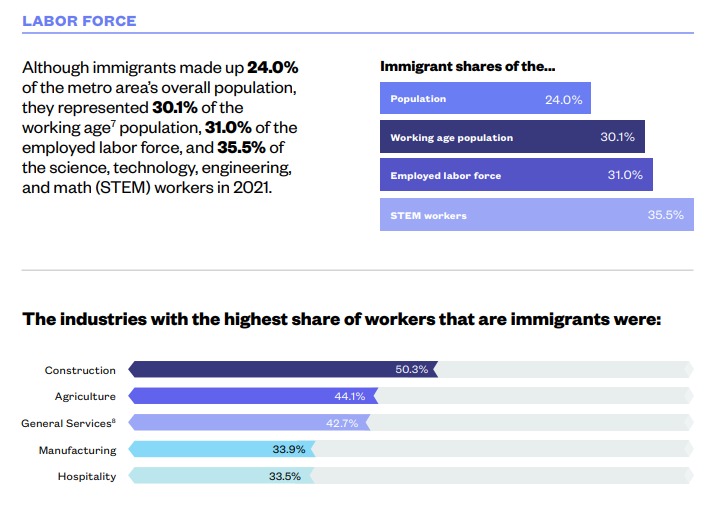
The full report on economic data for new Americans in Houston can be viewed by clicking here
Jeremy Robbins, Executive Director of the American Immigration Council, discussed causes of the current border crisis, including the overwhelmed and under-resourced asylum system that is incentivizing migrants to show up at the border. He also pointed out the economic opportunity that these challenges present if they are solved in a way that fosters orderly and legal immigration.
“This is important and wonderful data. We talk about it. If you look at what’s happening in our presidential election and what’s happening in our newspapers, that’s not the conversation that’s happening. How do we bring this data to the conversation? The first thing we have to do is acknowledge that we have a real problem with our immigration system that is not this. There are four failed states in our hemisphere and lots of other countries that are struggling. Right now we have record numbers of people coming to our southern border, our asylum system is completely overwhelmed and it’s the only line for most people to get in. So whether they’re looking for asylum or looking for a better life, people are getting in that line. What’s happening now is that the average time for an asylum case to get processed is four years. If you know that you can arrive and that you can wait four years and eventually work, that’s an incentive, and so more and more people are coming, and cities are completely overwhelmed. We have to acknowledge and think about a solution for that,” said Robbins.
“If you look at the solutions that are being offered, it’s like getting a sunburn and deciding I’m not going to go in the sun anymore. Immigration is a huge benefit to our economy. Saying that our system is strained and therefore we should shutdown the system, which is what both presidential candidates are now trying to say, ‘who can shutdown the border faster,’ if you have an economy where there’s such huge demand for workers, is shutting down the system the right approach? Fixing the system is the right approach…How do we do this in a way that that takes weeks or months and not years, because it is ridiculous if it takes four years. The system does not work if we’re not getting the result, if we’re not saying who has a right to stay here and who doesn’t. We need to create channels for people who want to come and work but we have to start with those solutions,” he added.
On the topic of healthcare, Dr. Esmaeil Porsa, President & CEO, Harris Health System, discussed the need for legislation to allow undocumented immigrants to purchase and pay for their own health insurance, which they are currently not allowed to do. In the current status quo, their only option for healthcare is uninsured and more costly. The creation of a conditional method for them to earn legal status could accomplish this goal.
“Many years ago we started a program where we enroll residents of Harris County on a market exchange as part of the Affordable Care Act… At Harris Health systems almost a quarter of our patients are undocumented. Because of the existing federal regulations, we are unable to enroll these individuals in the same program I just described. Even if we are able to just enroll half of these people in this program, it will have a tremendous positive economic impact, we’ll have better health outcomes, our communities will be healthier,” said Porsa.
Irma Diaz-Gonzalez, President & CEO, Employment & Training Centers, highlighted the record number of open jobs in the U.S. economy that exceeds the number of unemployed Americans, and the key role that immigrants can play in filling those jobs.
“We have 10 million jobs in the U.S. that are open and we don’t have the workers to fill those jobs, so we have great needs in Texas but also nationwide. This is not just a Texas issue, it is a national issue,” said Diaz-Gonzales.
There were numerous elected officials and members of their staffs in attendance to witness and speak on the data and conversations that occurred, including Jay Guerrero with Senator Cornyn’s office, Kelli Waterman with Senator Cruz’s office, Enrique Garcia with Representative Sylvia Garcia’s office, Shirley Martinez with Representative Lizzie Fletcher’s office, Houston City Council Member Joaquin Martinez, and Harris County Commissioners Lesley Briones and Adrian Garcia.
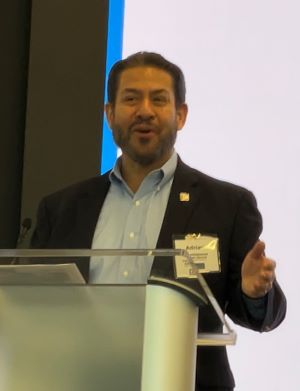 Commissioner Garcia empathized with migrants coming to the U.S. for better lives and called for incremental steps to fix the immigration system.
Commissioner Garcia empathized with migrants coming to the U.S. for better lives and called for incremental steps to fix the immigration system.
“In regards to the challenges at the southern border, instead of saying look at how many people are trying to come in, I would challenge us to look at it as why are people leaving their country. When you have no middle class, when you have no healthcare, when you don’t have educational systems that you hope your children can participate and learn from, it does create a void in the family unit… When you can see in easier terms today with iphones and the internet what is happening in this great country, it’s hard not to create that thirst of taking on that challenge of coming here under whatever circumstances,” said Garcia.
“Both sides of the aisle have fault and the opportunity to correct this…let’s take some incremental steps to address this. If this country fails to embrace immigration and fails to commit to fixing the system that is absolutely broken, then our future economy is in peril,” he added.
Commissioner Briones said, “The bottom line is we get so much more done if we do it together. As a natural optimist and a proud native Texan, it is very difficult for me to believe with the persistence, passion, intellect and grit that is Texas, that we cannot find a win-win-win solution on this issue. We know the economic arguments, we know the fundamental history of this nation as one of immigrants…we know that our diversity is our strength, power, and competitive advantage, and Texas must continue to lead not only the nation but the world as a global economy, and the way we do this is to double down on our strengths and use that solutions-oriented nature that as Texans we have.”
Another topic discussed relating to workforce was the economic impact that Texas SB4 will have on Texas industries facing workforce shortages as migrant workers leave the state. The new law makes crossing the Texas-Mexico border illegally a crime and allows Texas law enforcement officers and courts to arrest and deport migrants suspected of doing so. The law is currently being contested in federal courts over its constitutionality and judicial precedent that has historically held that the federal government supersedes states when it comes to the responsibility of enforcing immigration laws. On Tuesday the law was placed on hold by the Federal 5th Circuit Court of Appeals, which has yet to issue a final ruling on the bill since it was sent back from the Supreme Court from after it reached the High Court in what it ruled was improper procedure. SB4 is expected to make its way to the Supreme Court for a final ruling.







